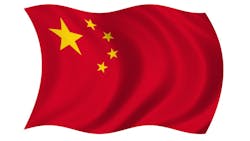Chinese Premier Wen Jiabao said Tuesday that stabilizing growth was a "top priority," after fresh data raised more worries of a slowdown in the world's second-largest economy.
"As a big developing country, a certain speed of economic growth must be maintained," Wen said. "Stabilizing economic growth is not only a top priority, but also a long-term arduous task."
His comments came shortly after the government reported that demand for imports fell more sharply than expected in June, leading to a widening of the trade surplus and stoking concerns about an economic slowdown.
A day earlier China said inflation slowed in June to its lowest level in 29 months, giving the government more flexibility in its efforts to reboot the economy.
Wen said encouraging domestic consumption, diversifying exports and boosting government investment would provide drivers for growth.
"Currently, it is important to promote reasonable growth in investment," he said in a statement.
His remarks came just three days before China is due to announce economic growth figures for the second quarter.
China's economy grew an annual 8.1% in the first quarter of 2012 -- its slowest pace in nearly three years.
Economists expect the economy to have grown 7.6% in the second quarter from a year earlier, according to a poll by Dow Jones Newswires.
China early this year set an annual economic growth target of 7.5%, down from expansion of 9.2% last year and 10.4% in 2010.
Interest Rate Cut Again
Among the measures already taken to avert a hard landing, the government last week cut interest rates for the second time in a month.
The government has also cut reserve requirements -- the amount of money banks must hold in reserve -- three times since December last year.
Top leaders have urged a move away from exports and the promotion of domestic consumption as the key engine of economic growth.
The nation's trade surplus hit $31.73 billion in June, up 42.9% from the same month last year, the General Administration of Customs said on Tuesday.
Imports Climb 6.3%
While exports for the month rose 11.3% year-on-year to $180.21 billion, imports climbed just 6.3% to reach $148.48 billion, according to the government's data.
"While exports increased at a low level, growth of imports was sharply slower than exports as domestic demand declined due to China's slowing economy," customs spokesman Zheng Yuesheng told reporters.
Compared with May, exports in June declined 0.5% and imports were down 8.9%.
"The data overall suggest that domestic investment and global growth are slowing," Alaistair Chan, an economist with Moody's Analytics, said in a research report.
Slowing domestic growth would prompt China to further ease monetary policy while at the same time boosting investment, analysts said.
Wen's remarks on Tuesday came after he warned at the weekend that the country's economy faced "downward pressure" and called for more aggressive moves to keep growth on track.
"China will definitely continue to introduce monetary easing policies," said Citic Bank International's chief economist, Liao Qun.
"There may be one interest rate cut and two cuts in the banks' reserve requirement ratio in the second half."
Copyright Agence France-Presse, 2012
About the Author
Agence France-Presse
Copyright Agence France-Presse, 2002-2025. AFP text, photos, graphics and logos shall not be reproduced, published, broadcast, rewritten for broadcast or publication or redistributed directly or indirectly in any medium. AFP shall not be held liable for any delays, inaccuracies, errors or omissions in any AFP content, or for any actions taken in consequence.
